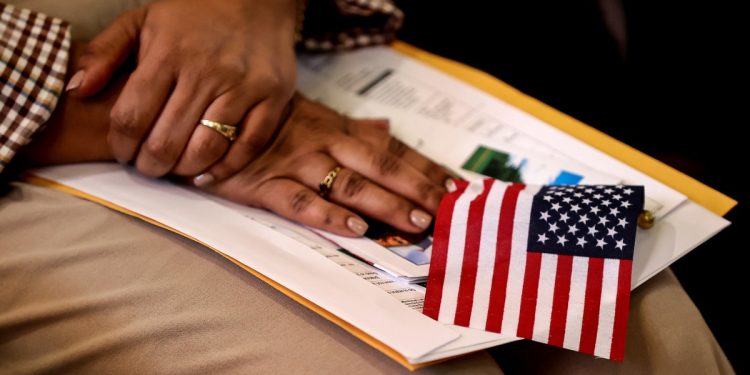As immigrants across the United States grapple with President Donald Trump’s executive order on citizenship rights, legal experts are sounding the alarm about what it will mean for visa-holding families.
The order, issued Monday on Trump’s first day back in office, states that not all children born in the United States are automatically granted U.S. citizenship. More specifically, for children whose parents are undocumented or have temporary visas – to work, travel or study – citizenship will not be acquired.
For some Asians, who dominate high-skilled work visas like the H1B and student visas like the F1, the prospect could be life-changing, experts say. If either parent is not a U.S. citizen or permanent resident at the time of the child’s birth, the order states, their child will not be a U.S. citizen.
Experts say this is a direct violation of the Constitution and the Supreme Court may not uphold it, but many immigrants are already afraid. Bethany Li, executive director of the Asian American Legal Defense and Education Fund, says she views Trump’s decision as an attempt to exclude certain groups on the basis of race.
“This order does not only target undocumented people,” Li said. “It targets people who arrive on a student visa. It targets people with a tourist visa. Ultimately, this order concerns those Trump considers American.”
Twenty-two states and several other entities have filed lawsuits against the Trump administration challenging the order, which experts say violates the 14th Amendment, which states: “All persons born or naturalized in the United States and subject to their jurisdiction are citizens. of the United States and the state in which they reside. »
The Trump administration did not respond to a request for comment.
Trump’s order argues that the “and subject to its jurisdiction” clause disqualifies children from these groups.
Experts say that in addition to being unconstitutional, the order risks creating bureaucratic problems, as some countries do not automatically grant citizenship to those not born in the country – even to children born parents who are citizens – meaning some children could be temporarily stateless.
“There could be a whole generation of stateless children who are not citizens in the United States, but they are not citizens elsewhere either,” said Aarti Kohli, executive director of the Asian Law Caucus, one organizations suing Trump. administration of the order.
For families seeking asylum after facing political persecution in another country, the situation could be even more complicated.
“We have refugees from Afghanistan and China. Our complainants are from Indonesia and are asylum seekers,” Kohli said. “It is very unlikely that they will be able to obtain travel documents or identity documents from the countries they are fleeing for their child.”
Li views the birthright citizenship order as a red herring, she said, because the 14th Amendment is very clear. She doesn’t believe the ruling will survive in court, but she thinks it could impact the desirability of the United States to potential immigrants around the world.
“This executive order aims to prevent Latin American and Asian immigrants from coming to this country and building lives here, which is fundamentally opposed to the values of the United States,” Li said.
It could also bring back a climate of violence and surveillance against immigrant groups, Kohli said. She discussed the establishment of the birthright in 1898, after a Chinese American, Wong Kim Ark, challenged the Chinese Exclusion Act in the Supreme Court.
“We had the lynching of Chinese workers,” she said. “The atmosphere was incredibly racist and yet our community fought back and challenged this order. »
Li and Kohli said they feared the first days of Trump’s term would be indicative of what awaits immigrants in the United States.
“This speaks to a broader policy direction of the Trump administration, which is a real tightening of our immigration system, limiting access to visas,” Kohli said.
Li says legal and undocumented Asian Americans, whose numbers are growing every year, should prepare for what’s next.
“I think there will be so many more battles to fight,” she said.


